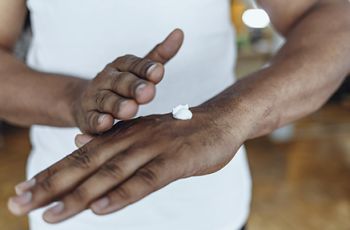Rakesh Kumar, Ph.D., chair of the Department of Biochemistry and Molecular Biology in the George Washington University’s School of Medicine and Health Sciences (SMHS), says the goal of his department’s Nobel Laureate lecture series “is to bring the best people in the world to Washington, D.C., and to GW.”
It’s a lofty goal, but one that was achieved, Feb 7, when Nobel Laureate Aaron Ciechanover, M.D., Ph.D., traveled from his home in Israel to Washington, D.C., to address a crowd of students, faculty, and staff at GW.
Ciechanover, who won the Nobel Prize in Chemistry in 2004 with two other scientists for describing how proteins are broken down by cell enzymes, was the second speaker in a lecture series that was launched by Ferid Murad, M.D., Ph.D., in September 2010. Murad, who won the Nobel Prize in Science or Medicine in 1998 for uncovering nitric oxide’s first biological effects, is now a University Professor at GW and a full professor in SMHS’s Department of Biochemistry and Molecular Biology.
During his lecture, Ciechanover discussed the road to his discovery, as well as how that knowledge has since influenced the creation of drug therapies.
When he first started out, he said, “people were mesmerized by transcription,” which is the process by which DNA is converted to RNA. “People didn’t care about destruction. They were fascinated with construction.”
But Ciechanover wasn’t like most people. He was interested in destruction. In particular, the degradation of a proteins in cells. “We are replacing every molecule in our body, and yet, we remain the same,” he marveled.
Intracellular protein degradation is important for “quality control” issues, Ciechanover explained. In the same way that the meat in the refrigerator goes bad, the quality of the protein in our cells dimishes over time. The body, then, has highly specific processes that replace the poor quality proteins with better ones. If these processes are imperfect, it can cause diseases like cystic fibrosis.
The idea that the human body is so dynamic was controversial for much of Ciechanover’s career. At some points, protein degradation was assumed to occur in the lysosome, the part of cells that breaks down other wastes.
But Ciechanover’s work helped to uncover the ubiquitin-proteasome system, which is now known to be the real driver behind protein degradation. “We now recognize that ubiquitin- and proteasome-mediated degradation of intracellular proteins is involved in regulation of a broad array of cellular processes, such as cell cycle and division, regulation of transcription factors, and assurance of the cellular quality control,” says the abstract of Ciechanover’s original Nobel Prize lecture.
Although his discovery has since led to the creation of certain drugs, including those for malignancies and neurodegenerative disorders, Ciehanover told the GW audience that his goal was never therapy-driven. “At the beginning, we never thought about drugs, we thought about the problem,” he said.
Ciahanover questioned the growing emphasis on young scientists’ to be “translational researchers,” or experts in moving basic scientist discoveries into therapeutics. Had he and his colleagues been encouraged to discover something that would one day become a drug, he doubts they would have been successful, he said. Today, he has no stake in pharmaceutical companies.
“The whole thing evolved out of a curiosity to answer an unanswered biological question — not to develop any drug,” he said. “I think it’s a lesson. It shows you that curiosity leads you to unexpected growth at the end."


